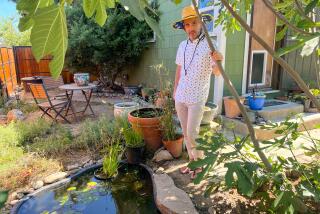Labor of Love Blooms Into Thriving Backyard Trend
- Share via
BUCKEYSTOWN, Md. — Charles B. Thomas was 14 years old and knee-deep in the cold, clear waters of a goldfish farm when he found his life’s work.
He cared little for the glittering fish but was enthralled by the fragrant, colorful water lilies that his uncle also grew at what was then one of the nation’s largest goldfish operations.
So a few years after becoming president of the family business in 1975, Thomas scaled back on fish production, changed the company’s name from Three Springs Fisheries to Lilypons Water Gardens and began transforming water gardening from a hobbyists’ cult into the hot backyard trend it has become.
Lilypons is now a leading supplier of products to the $100-million mail-order and wholesale water gardening industry. From its 300-acre headquarters in central Maryland and its production facilities near Houston and Palm Springs, it sells everything necessary to create a self-sustaining pond: plans, plastic liners, lamps, fountains, filters and, especially, plants.
“Maybe I’m addicted to their fragrance,” Thomas mused during a recent interview in his corner of a second-floor office he shares with four of Lilypons’ 45 year-round employees.
The stone building stands among scores of spring-fed ponds, stalked by egrets and herons, and crowded with lilies and lotus.
“They’re magnificent, aren’t they?” Thomas asked a visitor, pausing before a vast pond of ivory-colored lotus.
A smallish, balding man with quiet manners, Thomas, 60, seems more like a lily hybridizer than a business powerhouse. In fact, he is a lily hybridizer who named his white Virginia lily for his grandmother, his deep red Louise lily for his mother, and his blue tropical water lily, Margaret Mary, for his eldest daughter.
He founded the International Water Lily Society--a Columbia-based organization with members in more than 24 countries--in 1986 to promote water gardening.
But he is a dedicated businessman, too, the head of a company with annual sales of between $5 million and $10 million that ships 500 parcels a day in the peak of the season. Thomas said Lilypons’ sales of water gardening supplies are 50 times what they were when he took over from his uncle, C. Lease Bussard.
“His company is one of the superior companies in the field of water gardening,” said Camille Chioni, executive director of the Mail Order Gardening Assn., a Columbia-based group that counts Lilypons among its 200 member companies.
Thomas’ philosophy, “You can do best what you enjoy doing,” extends to his enthusiasm for instructing people in water gardening. He tolerates the novice’s wish for a pond with crystal-clear water, and sells products to satisfy that desire. But in his two books, Thomas gently presses the point that water-clouding algae is part of a healthy, ecologically balanced water garden.
“What I like to do is let people be aware of what causes algae, and then they can take steps to prevent it,” he said. “I don’t have to have a perfectly clear pool, but that goes against the grain of most Americans, and Europeans and Japanese as well.”
It was his appreciation for nature in balance that led Thomas away from the goldfish business his grandfather and uncle had built. Lilypons still keeps a dozen concrete tanks of fish for sale to retail customers at the company headquarters, but Thomas disliked raising creatures he knew would soon be dead.
“Most of them initially ended up in little bowls that were too small for them, in which the fish wouldn’t live more than a few weeks. Or they were used as feeder fish by tropical fish keepers,” he said. “It just didn’t appeal to me to be in the business of growing these fish for the purpose of being consumed.”
More to Read
Inside the business of entertainment
The Wide Shot brings you news, analysis and insights on everything from streaming wars to production — and what it all means for the future.
You may occasionally receive promotional content from the Los Angeles Times.










